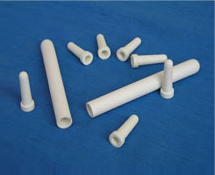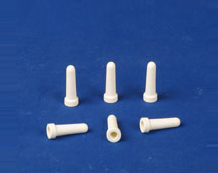

(1). automotive oxygen sensor zirconia ceramic tube (LH-ZFCA):
zirconia function in the research and development of ceramic materials, with large domestic auto enterprises cooperation, and developed a vehicle's oxygen sensor of zirconia ceramics, the detection, Germany BOSCH wholly achieved the level of similar products companies.
2). oxygen sensor on the vehicle introduced
Auto oxygen sensor is a solid electrolyte oxygen sensor, the zirconia ceramic oxygen sensor is the core automotive components. Its output signal is stable and reliable, strong anti-jamming performance. Vehicle exhaust emissions used to measure the oxygen content.
One, working principle
Oxygen sensor installed in the exhaust pipe. The electrodes detect the first contact with the exhaust, and the other electrode contact with the outside air, oxygen concentration due to internal and external electrodes differences arising from a potential difference.
When the concentration in the combustion gas mixture under excessive working hours, exhaust oxygen concentration in the lower oxygen sensor output voltage reference voltage to above. When the gas mixture in thin air in the state of excessive working hours, the exhaust gas oxygen concentration increased, oxygen sensor output voltage reference voltage to the following. High output voltage = = exhaust concentrated mixture of low oxygen concentration
Low output voltage = = dilute mixture of high exhaust gas oxygen concentration
For example, in the burning vehicle management, electronic control unit (ECU) will be oxygen sensor output voltage into a control signal by controlling the fuel injection volume change of air and fuel mixture ratio. Through closed-loop control, and controlling the three-way catalytic devices, which can be achieved to minimize exhaust emissions. In addition, the engine performance can be at its best. And to improve combustion efficiency.
Second, the composition ofHTYG-3/HTYG-4HTYG-3/HTYG-4 automotive oxygen sensor from zirconium tubes, heating rods, seals, signal output cable and connector components.
Zirconium contents of a heating rods cavity, the appearance of zirconium with a layer of paint permeability of platinum electrode. Because platinum electrode contact with the exhaust, which covers the surface layer of the high permeability close adhesion of the ceramic protective layer. Exhaust protective layer can prevent the corrosion residue catalytic platinum electrode, so that sensors can guarantee a longer life.
Third, technical parameters
| 1, the oxygen sensor temperature | 200 - 900℃ 200 - 900 ° C |
2, storage temperature range | -40 - 100℃ -40 - 100 ° C |
| 3, heater switch support after the opening of the exhaust temperature | 100 - 600℃ 100 - 600 ° C |
4, heater switch open to allow the maximum temperature | ≤800℃ ≤ 800 ℃ |
5, hexagonal casing temperature sensor | ≤500℃ ≤ 500 ℃ |
6, sealed sets of temperature cables | ≤200℃ ≤ 200 ℃ |
| 7, the temperature connector cables | ≤150℃ ≤ 150 ℃ |
8, the joint operating temperature | ≤120℃ ≤ 120 ℃ |
| 9, the temperature gradient sensor front-end allows | ≤100℃/S ≤ 100 ° C / S |
10, sensor temperature gradient allowing hexagonal casing | ≤500℃/S ≤ 500 ° C / S |
11, the maximum load current | ±1μA ± 1 µ A |
| 12, heating heater rated voltage | 12V 12 V |
| 13, between the heater and sensor insulation resistance value | ≥30MΩ ≥ 30 megohms |
| 14, internal resistance sensors | ≤250Ω ≤ 250 Ω |
15, the air-fuel ratio range | 12≤A/F≤17 ≤ 12 A / F ≤ 17 |
| 16, the output voltage | 10 - 1000mV 10 - 1000mV |
| 17, response time | ≤200ms ≤ 200 ms |
| 18, life | >1.0×105 Km > 1.0 × 105 Km |
Using zirconia ceramic oxygen sensor control 10% of the extensive use in a thermal power plant, petroleum, chemicals, iron and steel industry, glass, ceramic industry, metallurgy, textiles and other light industries in the field of boiler, coking furnace, calcination furnace, glass ceramic sintering kilns, cement kilns are hot stoves, hot carburizing processing furnace, furnace annealing furnace in the atmosphere, such as the oxygen measurement and control, to conserve energy and reduce environmental pollution and the extension of the old furnace triple effect.
